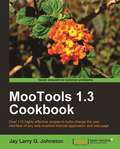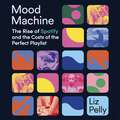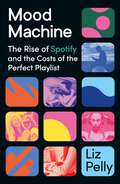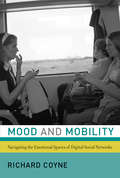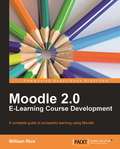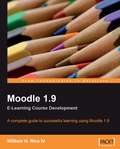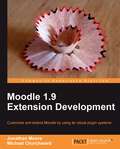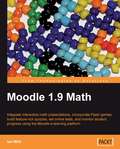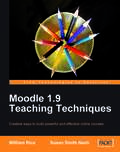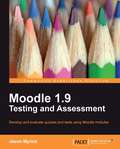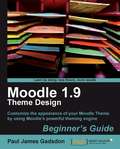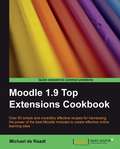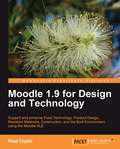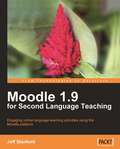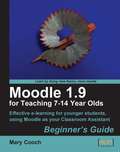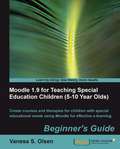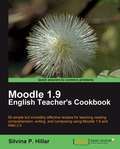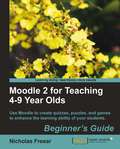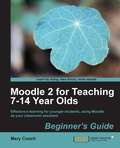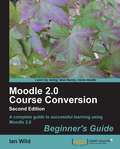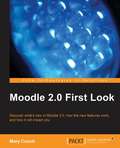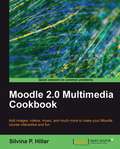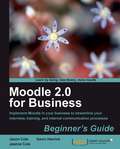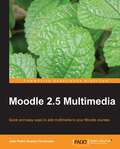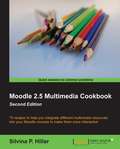- Table View
- List View
MooTools 1.3 Cookbook
by Jay Larry JohnstonThis is a cookbook full of recipes with the essential code explained clearly and comprehensively. The recipes are organized so well that you will have no problems in using this cookbook as a reference too.Users of all skill levels will find this book useful. Advanced users will expand their knowledge of MooTools interaction, intermediate users will delve into new concepts of usage. Novice users will find they are carefully taken through each facet of knowledge necessary to rapidly become intermediate users.
Mood Machine: The Rise of Spotify and the Costs of the Perfect Playlist
by Liz Pelly'Passionate and rigorous... riveting' Financial Times'[a] cool-headed but powerful polemic...' Sunday TimesAn unsparing investigation into Spotify's origins and influence on music, weaving unprecedented reporting with incisive cultural criticism, illuminating how streaming is reshaping music for listeners and artists alike.Drawing on over a hundred interviews with industry insiders, former Spotify employees, and musicians, Mood Machine takes us to the inner workings of today's highly consolidated record business, showing what has changed as music has become increasingly playlisted, personalized, and autoplayed.Building on her years of wide-ranging reporting on streaming, music journalist Liz Pelly details the consequences of the Spotify model by examining both sides of what the company calls its two-sided marketplace: the listeners who pay with their dollars and data, and the musicians who provide the material powering it all. The music business is notoriously opaque, but here Pelly lifts the veil on major stories like streaming services filling popular playlists with low-cost stock music and the rise of new payola-like practices.For all of the inequities exacerbated by streaming, Pelly also finds hope in chronicling the artist-led fight for better models, pointing toward what must be done collectively to revalue music and create sustainable systems. A timely exploration of a company that has become synonymous with music, Mood Machine will change the way you think about and listen to music.
Mood Machine: The Rise of Spotify and the Costs of the Perfect Playlist
by Liz Pelly'Passionate and rigorous... riveting' Financial Times'[a] cool-headed but powerful polemic...' Sunday TimesAn unsparing investigation into Spotify's origins and influence on music, weaving unprecedented reporting with incisive cultural criticism, illuminating how streaming is reshaping music for listeners and artists alike.Drawing on over a hundred interviews with industry insiders, former Spotify employees, and musicians, Mood Machine takes us to the inner workings of today's highly consolidated record business, showing what has changed as music has become increasingly playlisted, personalized, and autoplayed.Building on her years of wide-ranging reporting on streaming, music journalist Liz Pelly details the consequences of the Spotify model by examining both sides of what the company calls its two-sided marketplace: the listeners who pay with their dollars and data, and the musicians who provide the material powering it all. The music business is notoriously opaque, but here Pelly lifts the veil on major stories like streaming services filling popular playlists with low-cost stock music and the rise of new payola-like practices.For all of the inequities exacerbated by streaming, Pelly also finds hope in chronicling the artist-led fight for better models, pointing toward what must be done collectively to revalue music and create sustainable systems. A timely exploration of a company that has become synonymous with music, Mood Machine will change the way you think about and listen to music.
Mood and Mobility: Navigating the Emotional Spaces of Digital Social Networks
by Richard CoyneAn argument that as we engage with social media on our digital devices we receive, modify, intensify, and transmit moods.We are active with our mobile devices; we play games, watch films, listen to music, check social media, and tap screens and keyboards while we are on the move. In Mood and Mobility, Richard Coyne argues that not only do we communicate, process information, and entertain ourselves through devices and social media; we also receive, modify, intensify, and transmit moods. Designers, practitioners, educators, researchers, and users should pay more attention to the moods created around our smartphones, tablets, and laptops.Drawing on research from a range of disciplines, including experimental psychology, phenomenology, cultural theory, and architecture, Coyne shows that users of social media are not simply passive receivers of moods; they are complicit in making moods. Devoting each chapter to a particular mood—from curiosity and pleasure to anxiety and melancholy—Coyne shows that devices and technologies do affect people's moods, although not always directly. He shows that mood effects are transitional; different moods suit different occasions, and derive character from emotional shifts. Furthermore, moods are active; we enlist all the resources of human sociability to create moods. And finally, the discourse about mood is deeply reflexive; in a kind of meta-moodiness, we talk about our moods and have feelings about them. Mood, in Coyne's distinctive telling, provides a new way to look at the ever-changing world of ubiquitous digital technologies.
Moodle 1.9 E-Learning Course Development
by William RiceWilliam Rice is an experienced trainer and expert on learning and teaching practices. This experience and expertise forms the foundation of his approach: What do we want to teach? How would this best translate into a course? How best can Moodle support these course objectives? Of course, the book contains everything you'd expect from an introduction to Moodle: clear step-by-step instructions, plenty of screenshots, explanations and guides through the many features and options that you have to choose from. Throughout the book, William develops an example course. He uses this example to explore the sort of decisions, design considerations, and thought that goes into developing a successful course. This book is for anyone who wants to get the best from Moodle. Beginners will get a thorough guide to how the software works, with great ideas for getting off to a good start with their first course. More experienced Moodlers will find powerful insights into developing more successful and educational courses.
Moodle 1.9 E-Learning Course Development
by William RiceWilliam Rice is an experienced trainer and expert on learning and teaching practices. This experience and expertise forms the foundation of his approach: What do we want to teach? How would this best translate into a course? How best can Moodle support these course objectives? Of course, the book contains everything you'd expect from an introduction to Moodle: clear step-by-step instructions, plenty of screenshots, explanations and guides through the many features and options that you have to choose from. Throughout the book, William develops an example course. He uses this example to explore the sort of decisions, design considerations, and thought that goes into developing a successful course. This book is for anyone who wants to get the best from Moodle. Beginners will get a thorough guide to how the software works, with great ideas for getting off to a good start with their first course. More experienced Moodlers will find powerful insights into developing more successful and educational courses.
Moodle 1.9 Extension Development
by Jonathan MooreThe author's experience as a Moodle developer enables him to combine a simple, descriptive how-to approach with enthusiastic insights into the rich potential of customizing Moodle according to your needs. The chapters gradually build up your skills and by the end of the book you will be confident enough to customize Moodle on your own. This book is written for technologists who are interested in expanding Moodle's functions through programming, either for their own organizations or to contribute to the open source project. You should be familiar with Moodle's basic technologies: PHP, MySQL ,and HTML/CSS.
Moodle 1.9 Math
by Ian WildThe book presents the reader with clear instructions for setting up specific activities, based around an example maths course (Pythagorean Theorem) with plenty of examples and screenshots. No Moodle experience is required to use the book, but the book will focus only on activities and modules relevant to teaching mathematics. We will assume that the reader has access to a working installation of Moodle. The activities will be appropriate for teaching math in high schools and universities. The book is aimed at math teachers who want to use Moodle to deliver or support their teaching. The book will also be useful for teachers of "mathematical sciences", or courses with a significant mathematical content that will benefit from the use of some of the tools explored in the book.
Moodle 1.9 Teaching Techniques
by Susan Smith Nash William RiceThis book contains clear guidance for all who want to put together effective online courses that motivate students and encourage dynamic learning. There are clear, step-by-step instructions with helpful screenshots and diagrams to guide you along the way. If you want to unleash your teaching talents and develop exciting, dynamic courses that really get students moving forward, then this book is for you. Experienced Moodlers who want to upgrade to Moodle 1.9 will find powerful insights into developing more successful and educational courses.
Moodle 1.9 Testing and Assessment
by Jason MyrickThis book is an illustrative how-to guide with many screenshots and examples that helps you to create simple to complex tests and assess them using Moodle. It covers effective usage of tools available in Moodle and offers some Moodle options that you may not have tried yet. It will guide you from the basic philosophy of online testing to creating skill-based assessments in Moodle.If you are a tutor or Moodle Administrator who is responsible for developing and evaluating an online test using Moodle, then this book is for you.This book assumes that you have already successfully installed and set up a Moodle site for teaching.
Moodle 1.9 Theme Design: Beginner's Guide
by Paul James GadsdonThis is a Beginner's Guide, with plenty of worked examples, step-by-step visual guides, and explanations. If you are a Moodle administrator, ICT technical personnel, designer or a teacher and wish to enhance your Moodle site to make it visually attractive, then this book is for you. You should be familiar with the basics of Moodle operation, and some familiarity with web design techniques, such as HTML and CSS, will be helpful.
Moodle 1.9 Top Extensions Cookbook
by Michael De RaadtThe disorganised array of modules available for Moodle are brought together in ways you can relate to. Reviews include details that will help you decide if a module is worth testing. There are illustrated, step-by-step guides to installing and configuring modules.If you are involved in teaching using Moodle, be it at relatively small institutions running their own Moodle instance, or at large institutions where Moodle is used and administered, or you are an administrator of a Moodle instance who is looking for modules that will be useful to teachers and students at their institution, this book is meant for you.Get students organised and help them manage their time
Moodle 1.9 for Design and Technology
by Paul TaylorThis book has real-world samples of how to solve problems related to Design and Technology and offers tips on how to enhance the use of Moodle to get the most out of the subject. Worked examples will act as a base from which to build complex and exciting courses for students in all age ranges and abilities. If you are a Design & Technology teacher, teaching assistant, head of department, SMT, or IT technician in school and would like to use Moodle to design, create, or administer a VLE for Design and Technology, this book is for you. You need to know the basics of Moodle for teaching and learning and should have some experience with Design and Technology.
Moodle 1.9 for Second Language Teaching
by Jeff StanfordThe author's experience as a teacher enables him to combine a simple, descriptive how-to approach with enthusiastic insights into the rich potential of Moodle for creating engaging, useful language learning activities. The book is based on Moodle 1.9 and gives clear instructions with lots of screenshots. There are dozens of examples of activities that you can use to create your own online activities. This book is written for teachers, trainers, and course planners with little or no experience of Moodle who want to create their own language learning activities.
Moodle 1.9 for Teaching 7-14 Year Olds: Beginner's Guide
by Mary CoochThis book is part of Packt's Beginner's Guide series. Written in a friendly tone, the book starts at the very beginning with a blank Moodle page and you are taken step by step through the most useful features of Moodle, helped with many illustrative screenshots. The chapters gradually build up your skills and by the end of the book you will be confident enough to design a fully functional, interactive course for 7-14 year olds. This book is for regular, non-technical teachers of pre-teen or early teenage children. It assumes no prior knowledge of Moodle and no particular expertise on the Web. Classroom assistants may also find this book a very useful resource.
Moodle 1.9 for Teaching Special Education Children (5-10): Beginner's Guide
by Vanesa S. OlsenWritten with a step-by-step but friendly and engaging approach, this Packt Beginner's Guide is designed to be placed alongside the computer as your guide and mentor. Step-by-step tutorials are boosted by explanations of the reasoning behind what you are doing. You will quickly pick up the necessary skills, tips, and tricks for creating practical exercises using Moodle 1.9 with practical examples and see how the child with special education needs progresses. If you are an SEN teacher or SEN therapist with minimal knowledge of Moodle who is willing to exploit Web 2.0 possibilities using Moodle 1.9 as the background platform, this book is for you.
Moodle 1.9: The English Teacher's Cookbook
by Silvina P. HillarThis book follows a cookbook style, which will help you achieve outstanding results using ready-to-use recipes for reading comprehension, writing, and composition holding hands with Moodle 1.9 in the Web 2.0 Era. Each recipe is unique; some deal with similar teaching techniques, but they show how to develop the same technique using different software, situations, or topics. Images, videos, poems, songs, artists, classic stories, cartoons, superheroes, painting, the environment, and comics are inserted into the Moodle course, in order to be used as either prewriting or writing activities. If you are an English teacher who wants to discover practical, funny, and engaging activities to insert in your course, this is a perfectly designed book for you. It will help you to use different techniques in the teaching of reading comprehension, writing, and composition using a great variety of resources from the free and open source software available in the Web and interesting websites as well as social networks. You need basic experience with Moodle 1.9 or 1.9.5, as well as installation and configuration procedures.
Moodle 2 for Teaching 4-9 Year Olds Beginner's Guide
by Nicholas FreearPart of Packt's Beginner's Guide series, this book will steadily guide the reader through exercises using practical examples that are easy to build, which are illustrated with screenshots. The activities become steadily more sophisticated and include combining the content from one module with another. This book is aimed at teachers of children aged 4 to 9 who wish to integrate the Moodle open source virtual learning environment into their teaching. It assumes a basic knowledge of the Web but no prior knowledge of Moodle, although it is expected that you will either have Moodle already set up in your school, or a friendly IT technician who can do it for you.
Moodle 2 for Teaching 7-14 Year Olds Beginner's Guide
by Mary CoochThis book is part of Packt's Beginner's Guide series. Written in a friendly tone, the book starts at the very beginning with a blank Moodle page and you are taken step by step through the most useful features of Moodle, helped with many illustrative screenshots. This book is for regular, non-technical teachers of pre-teen or early teenage children. It assumes no prior knowledge of Moodle and no particular expertise on the web. Classroom assistants may also find this book a very useful resource. We will assume that you have an installation of Moodle managed by somebody else, so you are responsible only for creating and delivering course content.
Moodle 2.0 Course Conversion, Second Edition
by Ian WildWith clear instructions and plenty of screenshots, this book provides all the support and guidance you will need as you begin to convert your teaching to Moodle. Step-by-step tutorials use real-world examples to show you how to convert to Moodle in the most efficient and effective ways possible. Moodle Course Conversion carefully illustrates how Moodle can be used to teach content and ideas and clearly demonstrates the advantages of doing so. This book is for teachers, tutors, and lecturers who already have a large body of teaching material and want to use Moodle to enhance their course, rather than developing brand new ones. You won't need experience with Moodle, but will need teacher-access to a ready-installed Moodle site. Teachers with some experience of Moodle, who want to focus on incorporating existing course materials will also find this book very useful
Moodle 2.0 First Look
by Mary CoochThe book looks at the main functional areas of Moodle that have significant new features, explains the new features and how to use them. It draws attention to significant differences from how things used to behave, and gives the reader an idea of the kind of consequences these changes will bring to them. If you are an existing Moodle user, tutor, or administrator, then this book is for you. You are expected to be familiar with the operation of Moodle.
Moodle 2.0 Multimedia Cookbook
by Silvina P. HillarPart of Packt's Cookbook series, each chapter focuses on a different multimedia effect. If you don't have the time to work your way through a long tutorial, then this is the book for you. The step-by-step recipes are independent from each other so you can dip in and out of the book to add great effects to your course as and when you need them. This cookbook is designed for teachers who want to learn how to insert different multimedia assets into their Moodle courses. It is expected that you will have basic knowledge of Moodle 1.9 or 2.0 and have Moodle installed and ready to be worked on. Teachers of different subjects can adapt the recipes to best suit their specific subject.
Moodle 2.0 for Business Beginner's Guide
by Jeanne Cole Gavin HenrickPart of Packt's Beginner's Guide series, each chapter looks at a different aspect of using Moodle in a business environment, and steadily guides the reader through setting Moodle up in their own business with the help of practical examples, accompanied by lots of screenshots. Each chapter also includes case studies from well-known companies that have already implemented Moodle. If you are responsible for training, recruitment, or maintaining any guidelines within your company, then this book is for you. No previous experience with Moodle is necessary as the examples are easy to follow
Moodle 2.5 Multimedia
by Joao Pedro FernandesA tutorial-based guide where readers can work through practical examples that clearly describe how to create multimedia applications using Moodle and integrate existing multimedia resources into Moodle courses.If you are a teacher or trainer who runs online courses and has a basic understanding of Moodle, this book will be ideal for you. It is not necessary to have an advanced technical background to create multimedia elements as the tasks will be simple, not time consuming, and will be practical for everyday use.
Moodle 2.5 Multimedia Cookbook - Second Edition
by Silvina P. HilarWith practical examples presented in the style of recipes, this book is designed for you to be able to dip in and out as you need, only using the multimedia options that you want at the time.This cookbook is designed specifically for teachers who want to begin creating interactive and engaging Moodle courses by utilizing the multimedia capabilities of Moodle.
